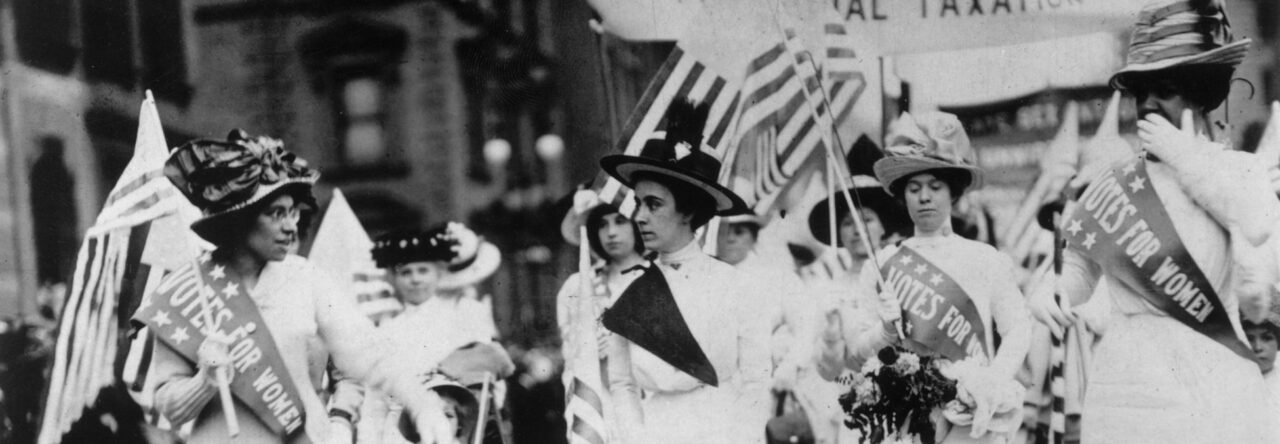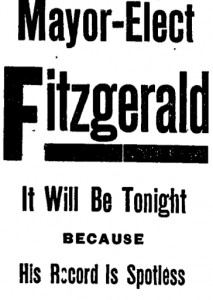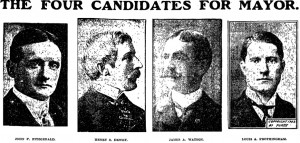As he took the oath of office in the shadow of a snowy United States Capitol, John F. Kennedy stood for far more than the ascendance of one man to the office of the Presidency. Rather, his inauguration laid a capstone in the story of a family steeped in American political life for more than a half-century; a story that begins with John “Honey Fitz” Fitzgerald.
55 years earlier, a car carrying John Fitzgerald’s brother James and a representative from the Boston Daily Globe arrived at the Fitzgerald residence on Welles Avenue in Dorchester. As later recounted in a Globe story, James Fitzgerald and his reporting companion were greeted at the door by overwhelming elation: John would be elected Mayor of Boston.
Historian Doris Kearns Goodwin tallies Fitzgerald as having won 44,174 votes out of more than 92,000 cast; because his nearest opponents – a Republican and independent identified by Kearns Goodwin as having split the same demographics of voters – drew 35,028 and 11,628 votes respective, “Honey Fitz” had won a plurality victory in Boston. The Boston Daily Globe described the rousing cheers in Dorchester’s Codman Square as Fitzgerald made his way towards Democratic Party headquarters in downtown Boston, marking his first public appearance as Mayor-elect. As described in another Globe piece, a Fitzgerald supporter called out in the gallery of City Hall (which had never recorded a larger election night crowd), “what’s wrong with the old North End?”
The victory was likely quite gratifying for Fitzgerald. Kearns
Goodwin asserts that the Mayorship was a position that intrigued him for some time, but it had not seemed to be the right opportunity until 1905. It was a race in which he had worked incredibly hard, up to and including election day. The Boston Daily Globe reported that Fitzgerald began December 12th with a “whirlwind” campaign through each of Boston’s 25 wards, followed by meetings with his campaign staff that lasted a significant part of the day. As the day waned, Fitzgerald focused on a ground campaign in his tougher wards, even having an encounter with a hostile ward boss, described in the same Globe article:
“Cheer up Martin. Don’t be discouraged,” said Mr. Fitzgerald, his remarks evidently being designed to carry with them the impression that the battle was all over but the shouting, but Martin failed to see the humor of the situation and scowlingly looked defiance as the democratic standard bearer was whisked away in his automobile.
As much as it was victory for Honey Fitz, it was equally sweet relief for other members of the Fitzgerald family, some of whom had trouble concealing their nervousness on election day. “Miss Rose,” as the eldest daughter of Honey Fitz and future mother of John Kennedy is described in the Globe, was so nervous that she “visited her church and offered up a fervent prayer for the success of her father” on election day. More than a century later, it is clear from Boston’s political and ethnic landscape that she did not have cause for great concern.
The late-19th and early-20th centuries were as transformative for Boston as for the United States as a whole.

A photograph of Copley Square in downtown Boston, circa 1912. The building on the right is the Boston Public Library, which still stands.
The 1900 Census shows that between 1850 and 1900, the number of people living in Massachusetts’ capital city more than quadrupled from just over 130,000 to over half a million, a number propelled upward by an influx of Irish immigrants. The Harvard Encyclopedia of Ethnic Groups, compiling several decades of Census data, reports that Boston saw 45,000 Irish-born residents in 1860 and 71,000 by 1890, or 12 percent of the entire city’s population.
The transition from a bastion of Brahmins to a center of immigration was not easy for Boston. Kearns Goodwin shows that with the swell of Irish Bostonians came the blight of slums and poverty, a trend that slowly edged the wealthier families out of the North and South Ends and into the Back Bay and Beacon Hill. While this separation likely served to propogate discrimination, it also helped to generate a formidable and cohesive political machine. Combined with voting regulations that were comparatively equitable (as Virginia Harper-Ho reports in Law and Inequality), Irish Bostonians were able to assume major influence on their city’s political process. In 1885, just 30 years after Irish immigration reached its peak, Boston had elected its first Irish mayor. A few months after John Fitzgerald walked the streets of Boston’s wards on election day 1905, an official guide to Boston’s mayors had four Irish-Americans within its pages.
44 years later, John Fitzgerald passed away. An Alderman, Congressman, and Mayor, his obituary in the New York Times hailed “one of the most colorful figures in the history of Boston politics.” A product of an oft-painful chapter in the history of Irish-Americans, he never lost sight of that sense of attention to people that was honed so carefully across decades of election days. His grandson, the late Senator Edward M. Kennedy, would recall in his autobiography that, as late as 1947, Honey Fitz would tip a hotel bellman to ring the bell once for a guest from Massachusetts and twice for a guest from Boston. Every time the bell rang twice, any guest at the hotel could hear, in a great booming Irish brogue, “you’re from Boston, aren’t you!”



Leave a Reply
You must be logged in to post a comment.